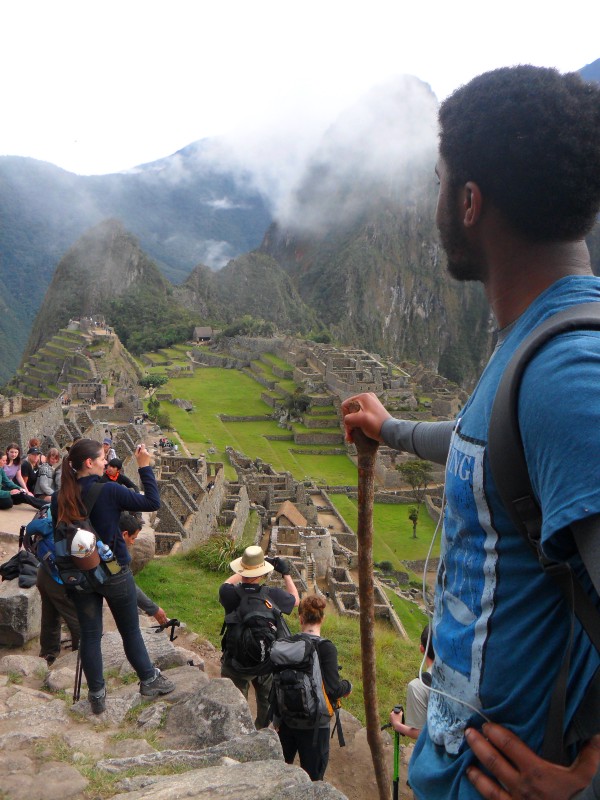Always Following My Curiosity Made Me A VC That Bets On The Underrepresented

A few months ago, over lunch a friend mentioned:
“I first came across your name from your writing [articles] but I had no clue that you had this experience and your story was so unique.”
That comment was the catalyst for writing this post. In this post, I want to break down the components that led me to start writing and how traveling, entrepreneurship, product management, and diversity in tech has provided me with a satisfying career to date as well as rare experiences.
These seemingly unrelated themes have been tied together by a consistent pattern of events. I am led by curiosity. This curiosity lands me in uncomfortable positions. Growth occurs at the edge of my comfort zone.
Traveling
I grew up in the relative poverty of Tottenham, North London. The first time I traveled abroad with my family was just before 2008. We went to Ghana — my country of origin — for my grandmother’s funeral. Five years later, I made the trip again, that time to bury my father.
The trips to Ghana have always had an enriching influence over my mindset. The reason for this is twofold. Firstly, they reminded me that some people are born into families that encourage education; others don’t believe in it. Some are born into thriving economies encouraging of entrepreneurship; others are born into war and destitution. My parents wanted my siblings and me to be successful, and they wanted us to earn it. But I quickly realized that not all success is due to hard work, and not all poverty is due to laziness. I had high potential and high access to opportunity because I was born in London, UK. Whereas my cousins back home in Ghana had high potential but low access to opportunity. I was lucky, privileged, and it was down to no virtue of my own.
Secondly, these trips put into context that my dad was effectively an orphan and grew up living with family members, as his father passed away when he was 2 and his mother couldn’t afford to look after him. His hard work ethic came from working on a farm at an early age in order to survive and hustle his way into Nigeria for work, before finally settling in London for the same. My grandad similarly worked in logistics and therefore traveled across Ghana and neighboring countries for work. My dad, grandad and I were all born on a Monday and therefore in accordance with Ghanaian Ashanti naming tradition we each inherited the name Kwadjo.
It should be no surprise that like my fathers before me, I too ended up traveling for work. I had the pleasure of traveling to over 40 countries across 5 years, working in South Africa, Italy, USA (SF & Silicon Valley), Namibia, Botswana, Kenya, and Uganda to name a few. This gave me global respect for differing cultures and an appreciation for the similarities and differences in how people work and intertwine with wider society. I learned about global systems of oppression that were intersectional across race, class, and gender first hand. This is why it deeply upsets me when diversity is considered for gender equality only.
Entrepreneurship
After my father passed away, my 60-year-old mother moved to Ghana and became an entrepreneur. She started a Nursery offering subsidized preschool education and care in a town in the suburbs of Ghana’s capital city Accra. This inspired me but didn’t surprise me as my family has always been enterprising. I had an aunt who owned a shop in Tottenham, uncles who owned businesses in Ghana, and my brothers and I co-founded a music discovery and distribution business in 2011, Mixtape Madness. One of my brothers is still the CEO today.
Starting a business in 2011 was heavily influential on my career. I was working as a Management Consultant at that time and it taught me that in my day job I was advising companies on strategy and learning the art of B2B business development & sales. However, outside work, I was executing and building things with tech. I learned about focusing on problems for a community of users and not distractions from competitors. I learned about empathizing with customers and, most importantly, understanding that I am building for customers and not myself. My hunger for this outstripped my day job and from that point on, I wanted more skin in the entrepreneurial game.
The golden thread throughout my career is that I’ve done my best work when I have been a business builder.
Product Management
During my last years as a consultant, I had a rare opportunity to travel with one of the Partners to the city of San Francisco (SF) to start the Innovation business. At the time we rented a flat in SF for 7 months, unaware of what the true opportunity would be. Over the course of our time there we networked with educational institutions like UC Berkeley, Accelerators like RocketSpace, Corporate strategic outposts from companies like Capital One, and Standard Chartered Bank as well as a range of VCs such as Greylock Partners, Sequoia Capital, Andreessen Horowitz, and Lightspeed Venture Partners.
My experience in SF was pivotal, as I received a crash course into venture capital from world-renowned VCs. They had strong returns from their portfolio with differing business models for supporting and nurturing their startups. It also enabled me to speak to founders and realize my experience to date had a role in tech, it was called Product Management.
“I find it fascinating that we often are doing things that we don’t have the language to articulate what it is we are doing and sometimes that leads to us undervaluing our skill set and strengths.” — Nafisa Bakkar
I still get questions today from many about, “why didn’t I stay in SF?” My response is that I believe entrepreneurship is being democratized and to succeed in tech you don’t need to be based in SF. With the increased cost of living and barriers to immigration, it will also become increasingly more difficult to attract top talent to the Bay area.
In fact, my time there exposed me to the lack of diversity in tech whereby less than 1% of VC funding went to Black-owned startups and less than 0.2% went to Black women. Pattern matching became a term I was seeing the results from in practice. Investors were ignoring a large portion of the market as underrepresented founders were being overlooked and underestimated. The market was therefore undervalued and here is where I saw an opportunity.
Recently in an interview with Reid Hoffman on the Masters of Scale podcast, Kevin Systrom, Founder of Instagram, which started off as Burbn stated:
“We worked on Burbn, our friends liked it, but no one else liked it. And I’m like, looking back, I’m actually surprised anyone gave us money to work on this idea.”
This, my friends, is what I call an “Opportunity Cheque”. The first investment capital that provides the entrepreneur the financial runway to take a risk for a limited period of time. For many underestimated founders this opportunity is significant, as some can’t afford to take the financial risk of becoming an entrepreneur because it puts not only them but their whole family, at risk.
The Opportunity Cheque is instrumental and directly correlates with outcomes. Would we have Instagram today if Kevin was not afforded the opportunity to continue to take the risk with his initial idea? Would he have simplified it and focused on just photos? We will never know.
However, this highlights why it is so important for entrepreneurs from all backgrounds, globally to have equal access to the opportunity to take the risk.
“Entrepreneurship can come from anywhere and be from anyone, once provided with the opportunity to pursue it” — Andy Ayim
Diversity in Tech
This thesis I was forming on funding undervalued entrepreneurs was also being developed and acted upon in America by a few investors and founders I have written about such as Nas, Tristan Walker, and Kirsten Green. Sadly, I wasn’t seeing much activity mirrored across Europe which presented an opportunity in itself. However there was one investor that intrigued me the most.
She was formerly a tour manager and worked in music, as did I. She was from a working-class background, so was I. She is black, so am I. She didn’t have a background in VC, and had an unorthodox journey into tech and so did I. Her name is Arlan Hamilton. I wrote a few articles that included Arlan last year (such as Diversity as an Investment Thesis). For me, this was a role model I could relate to and identify with.
From co-founding a music startup with my brothers I understood the importance of understanding markets deeply, building products iteratively and testing with customers constantly in order to build a business. Last year there was an inflection point when I was considering starting a podcast and I reached out to interview Arlan and she fortunately accepted.
Similar to me, Arlan had been great at executing on a content strategy across video (Youtube & Instagram), countless events, podcasts and articles in publications from Techcrunch to Fast Company. Alongside this, there was a running theme associated with music interwoven into the Backstage Capital brand. References included Headliners for founders, Tours for events, Green Room for Content and Studio for developing new ventures. This is a missed trick by most VC’s, authentic brand building.
In 2018, I invited Arlan and the Crew to London on several occasions to introduce them to the London ecosystem partners, founders, and investors (highlights from Fireside Chat here). Unconsciously, I was lobbying for Backstage to come to London and invest in founders in the UK.
It’s Time for Change
It fills me with great joy that the new Backstage Accelerator will focus on supporting the best companies led by underestimated founders. Backstage will be working initially with cohorts in Philadelphia, London, Los Angeles, and Detroit.
I will be leading the program in London alongside the awesome Andy Davis and Anisah Osman Britton.
Like my father and my grandfather, irrespective of my intention, I inherited certain privileges which caused inequality for others such as women. Regardless of my intention, this impacts others. Last year my daughter was born and I am aware already of privileges she has inherited as well as the challenges she faces for the simple fact she will grow up as a Black woman in the UK. I am determined to utilize this opportunity to disrupt the power dynamics that currently govern society, such as the sparse funding that goes to black female founders as a start.
There’s a tired narrative that exists about who gets to win from building a successful startup. The dozens of founders who will go through the Backstage Accelerator are writing new stories about people who look like all of us (if you can see it, you can be it!). Their successful companies will benefit them, their investors, their employees, and their local communities.
Are you interested in staying up to date? sign up to my newsletter here.
Corporations, investors, ecosystem thought leaders — are you interested in partnering with us to change the narrative? Let’s talk.





